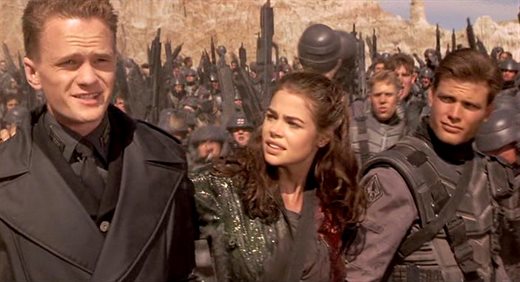Why I Watch Starship Troopers Every Canada Day
It should come as no surprise at all that I have little taste for nationalism and no appetite for blind patriotism. My very first critical read on these subjects came from my 10th grade history teacher, Marianne De Salis, who I hope is still alive and teaching in some capacity – even though the thought of her seeing what I’ve done with my life sends me into a shame spiral leading straight to a bottle of cheap whiskey.
Her lectures, assignments, and class debates always came back to a single idea: what does the citizen owe the state? In my estimation, the more that relationships expects the interests of the state to trump those of the citizen, as if the former is somehow divorced from the general welfare of the latter, the more the nation begins to resemble the likes of North Korea or the Terran Federation.
Which brings me to my Canada Day pastime since the early days of my first DVD player – which was actually a Playstation 2 – watching Paul Verhoeven’s sci-fi masterpiece, Starship Troopers.
It’s easy to look at a gratuitous and FX-heavy movie from 1997 and dismiss it as so much fluff from the bad old days of computer generated special effects. The movie has guts, gore, nudity, a mostly white cast, movie of the week-grade acting, and an utterly unsubtle tone both in its costuming and dialogue. But here’s the secret of the movie: all of that is on purpose.
Verhoeven, who was born and raised in Nazi occupied Holland, had a few opinions on Mr. Heinlein’s love letter to military service.
When we were working on the Heinlein book, we felt like we had something that was pretty militaristic, pretty right-wing, and you could even say had a tendency to be fascist. We felt we should counter that with irony and other means to make it interesting to ourselves.
From my reading, Mr. Verhoeven is being quite generous in his summary of the source material. Starship Troopers imagines a world where democracy failed as a misguided experiment of social scientists. “Social scientists” is written in the novel with the same sneering, righteous indignation that powers so many Twitter screeds against socialism, feminism, Marxism, or anything else that has nestled as a burr under the conservative-authoritarian saddle.
Heinlein’s imagined society – arguably, it is fair to suggest this is the society he idealizes – is one where the rights of the citizen are perpetually subordinate to the good of the state. The book goes so far as to deny voting rights to all residents of the Terran Federation until such time as they complete federal service. This service is often, but not always, in the form of military duty, and when this service is non-military it remains a brutal experience. Heinlein’s message is clear: some are more equal than others, and those deemed more equal are exclusively individuals who bleed for the state.
The genius of Paul Verhoeven’s movie is that it takes Heinlein’s plain-as-day philosophies and paints them large on the screen. Then, he injects just a little bit of historical allegory to show the audience a familiar end point to a system that elevates the state above the citizen. Thus, when people clutch their pearls and ask what is to be done about Neal Patrick Harris dressed up a Nazi, they are effectively grasping the intent of the film while missing its theme.
To wit, nationalism is tragically silly and a dangerous farce. The terrible things that are done in the name of righteous causes and god(s)’s ordained order reside in nationalism. Therein, just cause and the needs of the state become ubiquitous. Discourse is reduced to the party line shouting down dissenting opinions. Evoking the bombast and even the blocking of Buckley v. Vidal, or for you kids in the audience Lahren v. Noah, this single scene from Starship Troopers encapsulates the modus operandi of the conservative nationalist, right down to the lapel pin and Tucker Carlson bow tie.
“Frankly, I find the idea (insert thing you don’t like here) offensive!”
I don’t think Verhoeven could have possibly augured that one line could become the standard opening gambit in an era where the weight of facts evaporates with each passing day. Yet, there it is. The power of personal outrage in dictating policy.
I watch this masterpiece of a film once a year as a contemplative reflection on how much more state interest has been placed above that of the body politic. I reflect on the language of elected officials and their actions once in office. I contemplate how much banal rhetoric is injected into public conversations that require nuance and subtlety. I consider who the state is asking me to hate for the purported greater good of society. And finally, I ask myself if I’m doing my part.
On that note, I hope that my old history teacher has got this far into this post. While I do not begrudge my fellow citizens the right to celebrate their country, I still see no reason to become a face-painting participant. More work needs to be done. Voices raised in query or protest continue to be shouted down with the language of not supporting the country, the troops, or the ideology of the day. Reason and rationality are under siege from social fringes, fringes which work to insinuate themselves into the mainstream to the detriment of all. Individual rights and bodily autonomy are debated absent compassion, appropriate representation, or empathy.
I don’t know that I’m doing my part to fix those issues, but I’m certainly aware of them as I actively avoid trying to make them worse. As for these words, if I’ve done my part as a writer, I’ve given at least one person cause to watch Starship Troopers and reflect just a little bit on doing their part.
Would you like to know more?









